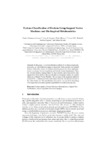Texture classification of proteins using support vector machines and bio-inspired metaheuristics

Ver/Abrir
Use este enlace para citar
http://hdl.handle.net/2183/19474Colecciones
- Investigación (FIC) [1725]
Metadatos
Mostrar el registro completo del ítemTítulo
Texture classification of proteins using support vector machines and bio-inspired metaheuristicsAutor(es)
Fecha
2014-11-02Cita bibliográfica
Fernández-Lozano C, Seoane JA, Mesejo P, Nashed YSG, Cagnoni S, Dorado J. Texture classification of proteins using support vector machines and bio-inspired metaheuristics. En: Fernández-Chimeno M, Fernandes PL, Álvarez S, et al, eds. Biomedical engineering systems and technologies: BIOSTEC, International Joint Conference on Biomedical Engineering Systems and technologies. Berlin: Spirnger; 2014. p. 117-130. (Communications in computer and information science; 452)
Resumen
[Abstract] In this paper, a novel classification method of two-dimensional polyacrylamide gel electrophoresis images is presented. Such a method uses textural features obtained by means of a feature selection process for whose implementation we compare Genetic Algorithms and Particle Swarm Optimization. Then, the selected features, among which the most decisive and representative ones appear to be those related to the second order co-occurrence matrix, are used as inputs for a Support Vector Machine. The accuracy of the proposed method is around 94 %, a statistically better performance than the classification based on the entire feature set. This classification step can be very useful for discarding over-segmented areas after a protein segmentation or identification process.
Palabras clave
Texture analysis
Feature selection
Electrophoresis
Support
Vector machines
Genetic algorithms
Proteomic imaging
Feature selection
Electrophoresis
Support
Vector machines
Genetic algorithms
Proteomic imaging
Descripción
6th International Joint Conference, BIOSTEC 2013, Barcelona, Spain, February 11-14, 2013
Versión del editor
Derechos
The final publication is avaliable at Springer Link
ISSN
1865-0929





